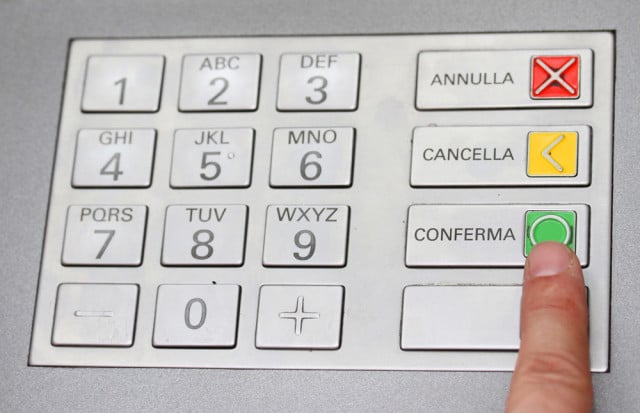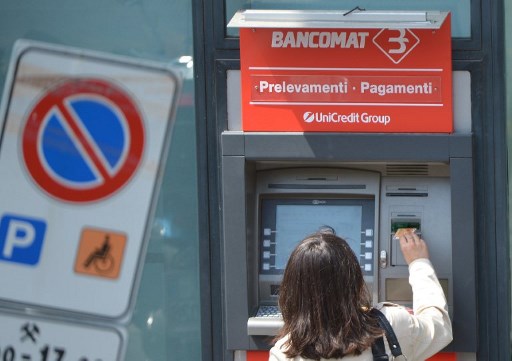Along with finding a flat and a job, opening a bank account is one of the first things you’ll need to do when arriving in Italy. Your overseas account is unlikely to cut it for everyday tasks like paying bills, withdrawing cash, or getting paid yourself.
Italy has a large number of banks to choose from, ranging from traditional Italian institutions to international banks and online-only operations.
Here are a few things to consider when choosing an account, based on readers’ recommendations.
What do I need to know about Italian bank accounts?
One of your first decisions is whether to opt for a resident or non-resident account. If you’re not going to be working in Italy and plan to stay for a short period of time (if you’re studying temporarily, for example), a non-resident account (conto estero) will be enough and, if you don’t have Italian residency, it’s all you can have.
This type of account doesn’t allow you to receive payments from within Italy, but it offers higher rates of interest.
Of course, if you’ve moved to the country you’ll want a resident account, for which you’ll need to be registered as a resident in Italy. (You don’t need to be an Italian citizen.)

Photo: Depositphotos
Which bank should I choose?
This is a difficult choice to make, as there’s a wide selection of banks in Italy with varying fees and account types available. It’s always wise to ask friends and family for recommendations as well as doing some online research.
To get you started, here’s are some of the most popular banks used by expats and our readers’ thoughts on each.
BancoPosta
The Italian post office offers various types of accounts and you’ll find a branch even in the smallest towns. The post office may not be known for speed but its banking offer has a good reputation among readers.
It has “the owest annual fees, better exchange rates for account holders, no ATM fees – and they’re everywhere,” says Peter Luigi Bonta in Pistoia.
Intesa San Paolo
Italy’s biggest private bank has plenty of branches and is often recommended as a good place to open a non-resident account. Plus opening an account here is “very easy”, according to reader Martin C Smith in Turin, with minimal fuss and paperwork.
Fineco
Several readers highly recommended Fineco, which they said was easy to manage online.
“I can easily manage my account online and keep deposits in multiple currencies. Paying taxes, utilities and other vendors is easy and quick and can be done from an app on my phone,” said A. Reed in Umbria, though she pointed out that US citizens must keep their balance “under 10 thousand or be subjected to additional IRS scrutiny.”
Alexandra Miletta in Rome agreed that her account with Fineco was easy to manage and “very straightforward” to set up.
Barbara Susan Bale in Naples said she could do almost everything online with Fineco, and praised the app’s “easy to navigate” interface – though she deducted points for the rudeness of staff in branches.

Photo: AFP
Unicredit
This major international bank has a large presence in Italy.
“You can open an account online and there’s no monthly payment for basic accounts. Branches of the bank are available in every city,” said reader Dilshya in Mogliano, Veneto, though she said you may be charged other fees by the bank.
READ ALSO:
- The real cost of buying a house in Italy as a foreigner
- 19 bits of Italian bureaucracy you can do online
- How to become Italian: A guide to getting citizenship
Basic account holders can be charged for every direct debit, and a two-euro fee for using an ATM belonging to another bank.
Deana Murray in Verona praised the variety of account options, and said fees were not too high.
“They were so friendly and patient with my Italian and made the whole process extremely stress free,” she said.
“Try not to open the account in a branch that is in a town in the middle of nowhere,” she warned. “Often if there is a problem, you will have to go back to that specific branch so try and open it in a city that is easy to reach in case you move.”
John Batten in Lazio agreed that the bank was “very helpful” – but warned that non-resident accounts come with a hefty fee of “at least €200 per year”.
CheBanca
This relatively new bank has no account fees or charges if you do everything online, and account holders told us that’s easy to do and praised the “user-friendly website.”
“My local branch was very helpful when I opened my accounts. You can go to any branch in Italy for assistance as your accounts are not associated with any specific branch,” said David Murphy in Sassari.
But check that you do have a local branch before opening an account, as it’s not found everywhere.
John Brown in Florence said the bank’s main attraction is “the good customer service and the lack of charges for many services. Only €1 monthly for a current account and €2 monthly for a prepayment bancomat card, useable here and abroad without additional charges.”
N26
A few readers also recommended this international online banking company, where accounts are free and can be opened online via a video call.
The fact that it’s based in Germany and has a deposit protection scheme from the German government is something many account holders find reassuring.
Daniel Tse in Mantova praised the bank’s “EU-wide access to cash machines irrespective of specific banks or building societies” the “decent English-speaking (and German-speaking) customer service support,” and “simple, transparent” fees.
He added that there are “no hidden fees, but beware of a maximum limit of five free cash withdrawals a month – even if the Summary of Charges says it is ‘unlimited’ (subject to ‘fair use’)”.
What are the requirements?
Some online banks such as N26 will allow you to open an account with an address elsewhere in Europe, although there are tighter restrictions on addresses outside the EU.
While the specific paperwork can differ from bank to bank, each application will require some combination of the following:
- An application form
-
Your ID card and/or passport
-
Your Italian tax number (codice fiscale)
-
Proof of your address (such as a utility bill)
-
An initial deposit (which will vary from bank to bank);
Non-EU citizens may have to fill out additional forms.
Application forms seem to always be in Italian, with no English translation available. Some larger banks may have English speaking staff but usually, unless you’ve arranged an appointment with an English speaker, it helps to take an Italian speaker with you to translate if you’re still getting to grips with the language.
Can I apply online?
Online-only accounts have become more popular in Italy in recent years as they often offer a greater degree of flexibility and lower (or no) account fees.
Traditional banks increasingly allow online applications, while others will want you to show up in person. As with so many things in Italy, a lot of readers said they found that applying in person is much more straightforward.
What kind of fees do I need to watch out for?
There are various different fees to look out for when opening an Italian bank account, and maintaining one can prove surprisingly expensive.
Almost all banks in Italy (except some online-only banks) charge monthly fees, which can be a nasty shock for people coming from countries like the UK, where this is unheard of. You don’t get much interest on most accounts, either.
They also tend to charge for withdrawals made from cash machines. Most banks allow you to make withdrawals (though often a limited number) from the bank’s own machines without paying a fee, so it might pay to choose a bank that has a good network of ATMs. Most banks have a default €300 daily withdrawal limit.
The fees you might have to pay include:
- Maintenance fee – a service fee, usually monthly, charged simply for having an account.
- Transaction fee – you might find that the bank charges you for each individual transaction that shows up on your statement.
- Cash withdrawal fee – if you use an ATM to withdraw cash, there is often a charge.
- Interest on checking accounts – Some checking accounts charge quarterly interest fees.
- International transfer fees – this can be a big deal. If you’re likely to want to send money abroad, check how much each bank will charge for this and shop around for the lowest fee.
- Cancellation fees – few of us think about this but some banks charge fees for closing an account. It can pay to check what will happen if you decide to cancel your account.
Not all bank accounts will charge every type of fee, so it’s worth shopping around to find an account that works in your favour.
Note that this is not an exhaustive list of all the banks available in Italy, and it pays to do as much research as possible before opening your account.




 Please whitelist us to continue reading.
Please whitelist us to continue reading.
I tried to open an account at CheBanca and Ing (April 2021).
Both asked for (what they called) Italian documents.
Seems, you need a kind of residence in Italy.
Unfortunately, they speak rather less English, and I rather no Italian.
So, may I misunderstood something wrong.
I had no problem opening fineco completely online, they accepted my English documents without any need for translations, the only time I’ve had to contact them, they understood English well so no problems there. Plus the app is also available in English, so so simple to do banking with them. This was for a resident account, no idea how easy it is for non residents though.
If you already have a Euro bank account in another EU country with standard SEPA IBAN number, and now find yourself living and working in Italy, then you do not need to open another bank account in Italy. Your existing Euro IBAN number can be used for salary payments and direct debits as well as payments in shops. Don’t let anyone tell you that you must have an Italian bank account … this would amount to “IBAN discrimination” which is illegal under EU law (SEPA Regulation (EU 260/2012)).
Might be illegal, but it happens a lot in Europe, Italy is no different to other EU countries. I found it easier to open an Italian account, than report every utility company.